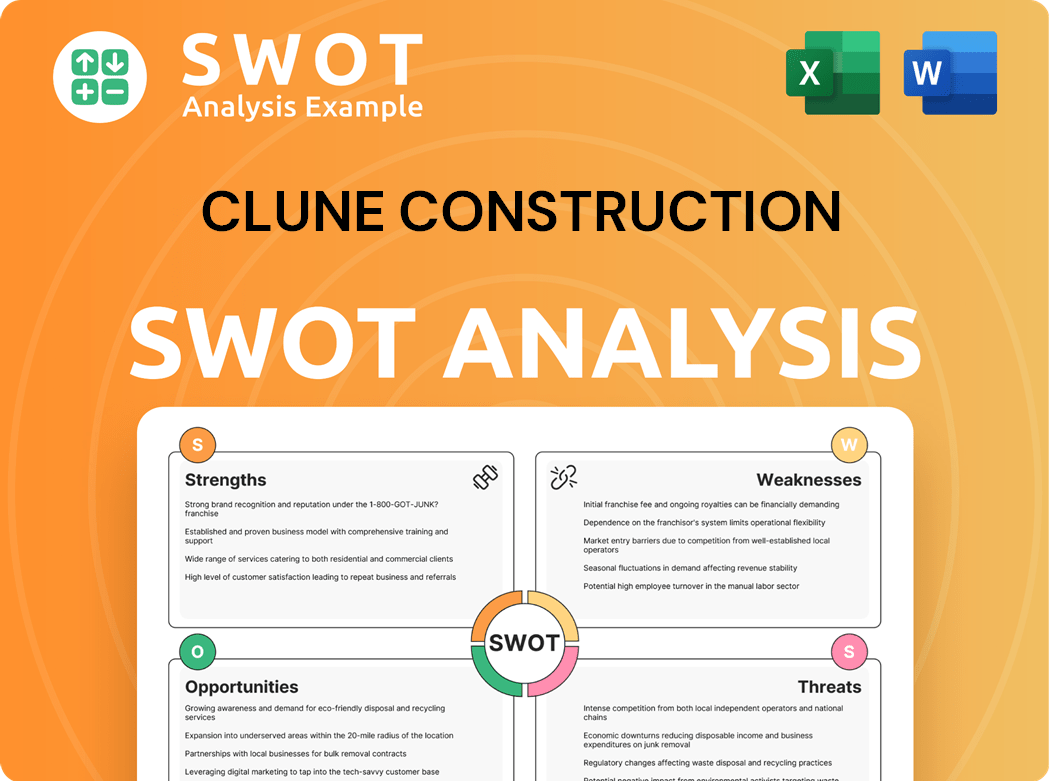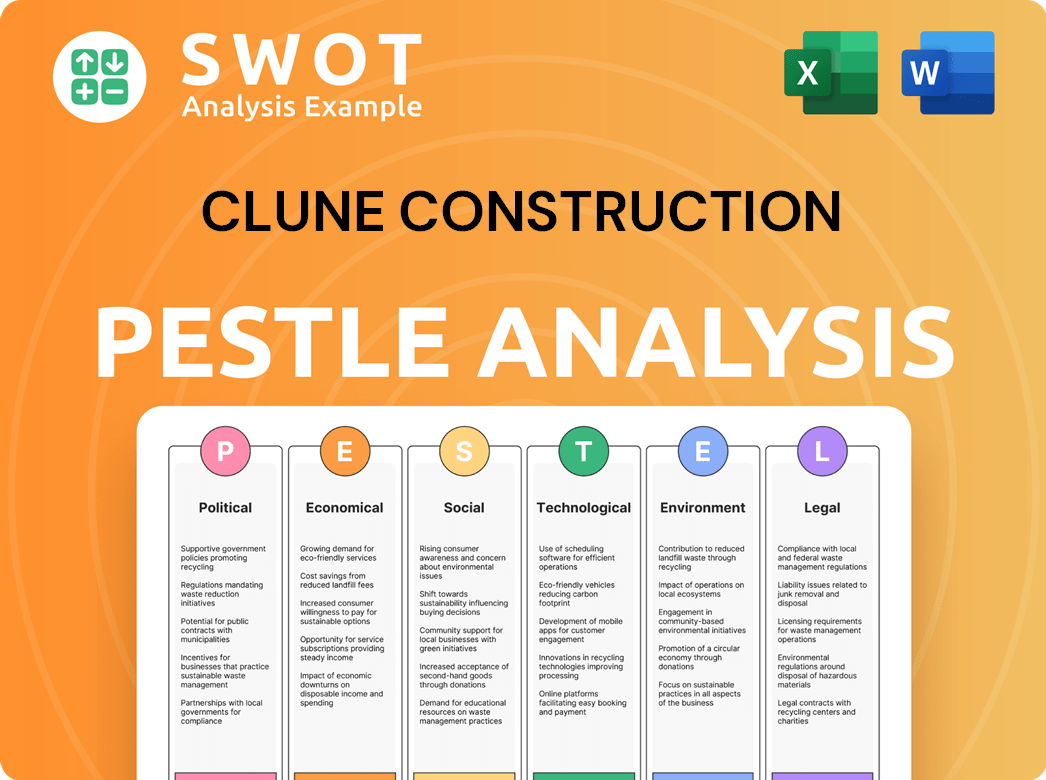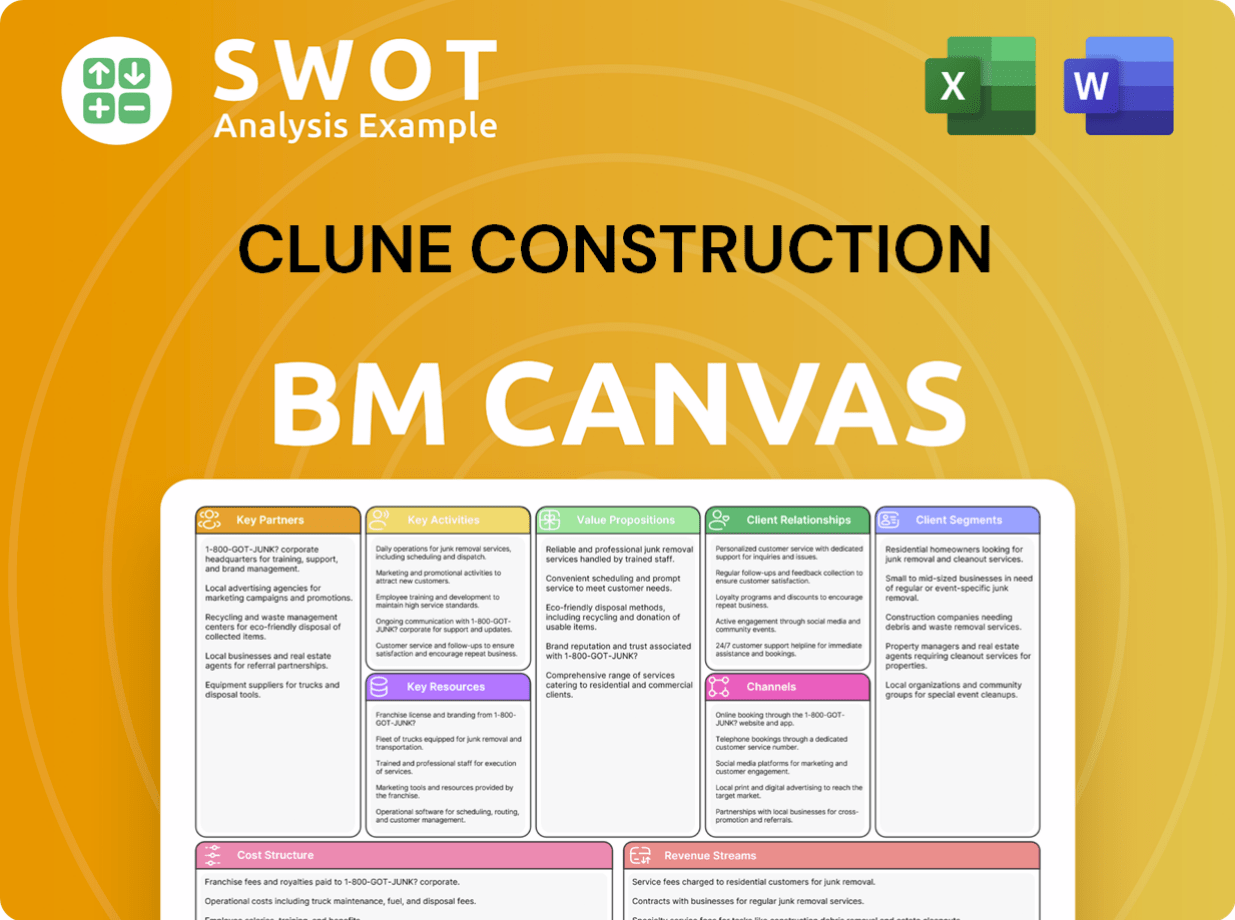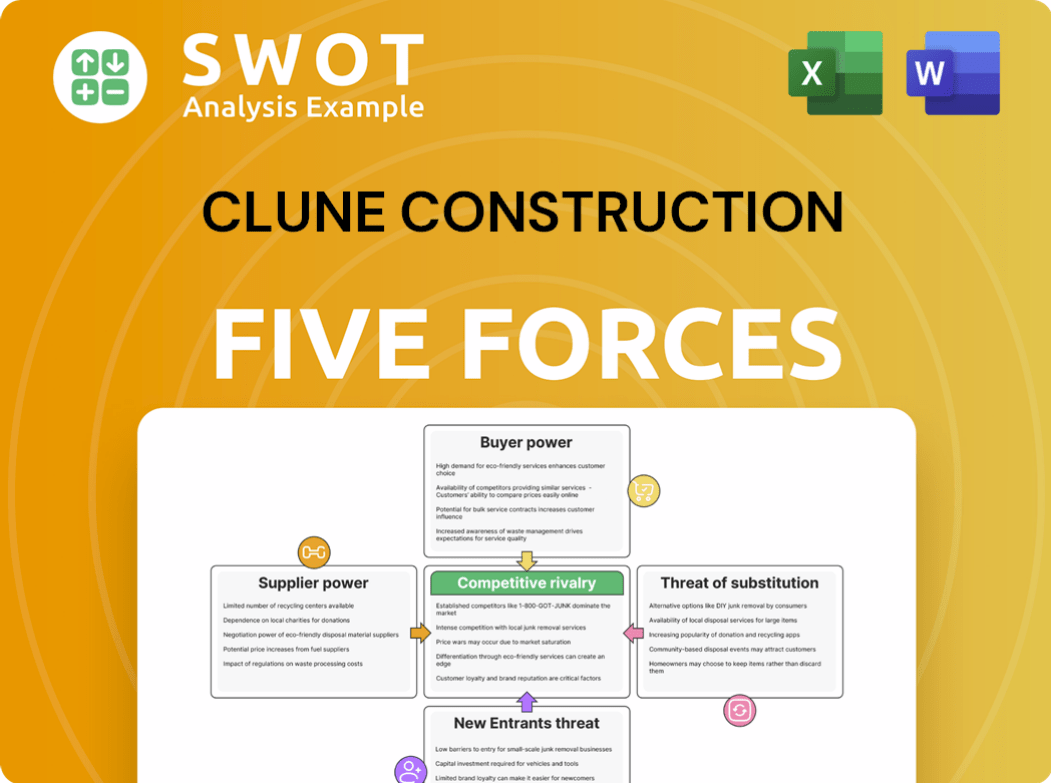Clune Construction Bundle
How Does Clune Construction Thrive in a Cutthroat Market?
The commercial construction sector, particularly interior build-outs, is a battleground of skill and strategy. Clune Construction Company, a prominent Construction Company, has not only survived but thrived in this environment. This analysis delves into Clune Construction's competitive landscape, examining its rivals and the factors that fuel its success.

Understanding the Clune Construction SWOT Analysis is crucial to grasping its position. This exploration will dissect Clune Construction's market share, evaluate its strengths and weaknesses, and analyze its competitive advantages. We'll also conduct a thorough competitor analysis, providing insights into how Clune Construction navigates the industry's dynamic shifts and maintains its impressive industry ranking.
Where Does Clune Construction’ Stand in the Current Market?
Clune Construction Company maintains a solid market position within the U.S. commercial construction industry. The company specializes in interior construction, mission-critical facilities, and base building projects. While specific market share figures are not always public, Clune consistently ranks among the top general contractors nationally, demonstrating its significant influence.
Clune's primary services include comprehensive construction management. This covers preconstruction, construction, and close-out phases. They serve a diverse client base across corporate, healthcare, and technology sectors. Their geographical presence has expanded beyond Chicago to establish a national footprint. Offices are located in major metropolitan areas such as Los Angeles, New York, San Francisco, and Washington D.C.
Over time, Clune has strategically focused on specialized segments. This includes mission-critical projects, catering to the growing demand for data centers and other high-tech infrastructure. This strategic diversification, combined with consistent financial health and project delivery, reinforces its strong competitive standing. Clune holds a particularly strong position in major urban centers where demand for high-quality interior build-outs and complex technical projects remains high.
Clune Construction is consistently ranked among the top general contractors in the U.S. The exact market share is not always available, but its high ranking indicates significant influence. In 2023, industry publications recognized Clune as a top contractor, showcasing its scale and impact within the Brief History of Clune Construction.
Clune specializes in interior construction, mission-critical facilities, and base building projects. This focus allows them to cater to specific client needs and market demands. Their comprehensive construction management services cover all project phases, from preconstruction to close-out.
Clune has expanded its operations beyond Chicago. They now have a national footprint with offices in key metropolitan areas. This strategic expansion enables them to serve a broader client base across the country. They cover major markets like Los Angeles, New York, San Francisco, and Washington D.C.
Clune has strategically focused on specialized segments like mission-critical projects. This caters to the growing demand for data centers and other high-tech infrastructure. This diversification strengthens their competitive position. They maintain a strong presence in urban centers with high demand for specialized projects.
Clune Construction's competitive advantages include a strong market position, diverse service offerings, and a strategic geographical presence. Their focus on specialized projects, like mission-critical facilities, positions them well for future growth. Consistent financial health and successful project delivery further enhance their standing in the industry.
- Strong national ranking among general contractors.
- Specialization in high-demand project types.
- Strategic expansion into key metropolitan areas.
- Comprehensive construction management services.
Clune Construction SWOT Analysis
- Complete SWOT Breakdown
- Fully Customizable
- Editable in Excel & Word
- Professional Formatting
- Investor-Ready Format

Who Are the Main Competitors Challenging Clune Construction?
The Target Market of Clune Construction operates within a highly competitive landscape, facing a diverse range of rivals. Understanding this competitive environment is crucial for strategic planning and assessing the company's market position.
The competitive landscape includes both direct competitors, such as other large general contractors, and indirect competitors, like specialized construction firms. Analyzing these competitors involves assessing their strengths, weaknesses, market share, and strategic initiatives.
Clune Construction Company's competitive landscape features a mix of national and international construction firms. These competitors often vie for similar projects, especially in the corporate interior and mission-critical sectors.
Structure Tone is a significant direct competitor, known for its extensive global presence and diverse project portfolio. They often compete for high-profile corporate interior projects, similar to Clune's focus.
Turner Construction Company is a major player in the industry, posing a challenge, especially in larger-scale commercial and institutional projects. They leverage their size and resources to compete effectively.
DPR Construction specializes in technically complex and sustainable projects, particularly in healthcare and advanced technology sectors. They often compete in mission-critical projects, overlapping with Clune's expertise.
Aggressive pricing strategies are a common tactic among competitors, aiming to secure contracts. This can affect profit margins and project selection.
Extensive national and international networks enable competitors to bid on a wider range of projects. This global reach is a key competitive advantage.
Continuous innovation in construction methodologies and technology is crucial. This includes adopting new technologies and techniques to improve efficiency and reduce costs.
Several factors drive competition in the construction industry. These include project timelines, cost-efficiency, and specialized expertise. The ability to deliver projects on time and within budget is critical.
- Project Timelines: Meeting deadlines is crucial, especially in fast-paced projects.
- Cost-Efficiency: Competitive pricing and efficient project management are essential for winning bids.
- Specialized Expertise: Expertise in specific areas, such as mission-critical facilities or sustainable construction, provides a competitive edge.
- Technological Advancement: Utilizing advanced digital construction techniques and technologies can improve efficiency and reduce costs.
- Geographical Presence: A strong presence in key markets allows for broader project opportunities.
Clune Construction PESTLE Analysis
- Covers All 6 PESTLE Categories
- No Research Needed – Save Hours of Work
- Built by Experts, Trusted by Consultants
- Instant Download, Ready to Use
- 100% Editable, Fully Customizable

What Gives Clune Construction a Competitive Edge Over Its Rivals?
Understanding the competitive landscape of a construction company like Clune Construction is crucial for investors, analysts, and industry observers. Analyzing its competitive advantages provides insights into its market position and future prospects. This involves evaluating its strengths, weaknesses, and how it differentiates itself from rivals in a dynamic industry. A thorough market analysis, including competitor analysis, helps to understand the factors driving Clune Construction's success.
Clune Construction's strategic moves and operational efficiencies are key elements in its competitive edge. The company's ability to secure projects and maintain client relationships is a testament to its robust business model. Examining its project portfolio and client base offers a clear view of its market presence. This analysis helps to assess its ability to adapt to industry trends and maintain a strong position in the market.
The company's financial performance and industry ranking are important indicators of its overall success. Evaluating its growth strategy and market position provides a comprehensive view of its competitive landscape. This analysis helps to understand how Clune Construction competes and what strategies it employs to maintain its competitive advantages. For more details, you can explore the Growth Strategy of Clune Construction.
Clune Construction's specialization in complex interior build-outs and mission-critical facilities allows for deep expertise and efficient processes. This focus leads to higher quality outcomes and faster project completion times. The company's ability to handle intricate projects sets it apart from general contractors, enhancing its market position.
A strong emphasis on client relationships and satisfaction is a key advantage. This collaborative approach fosters repeat business and positive referrals. This focus is particularly crucial in the service-oriented construction industry, where reputation and trust are paramount.
Clune Construction's national presence, with strategically located offices across major U.S. markets, provides localized service delivery. This allows them to serve multi-market clients efficiently and consistently. Leveraging a national network of resources and expertise is a strategic advantage.
A strong commitment to safety and quality control is a significant differentiator. This contributes to a strong brand reputation and mitigates project risks. These practices are essential for maintaining client trust and ensuring project success.
Clune Construction's established brand equity, deep client relationships, and specialized expertise contribute to sustainable advantages. These factors are difficult for competitors to replicate quickly, providing a lasting edge in the market. The company's focus on niche markets further strengthens its position.
- Specialized Expertise: Focus on complex interior build-outs and mission-critical facilities.
- Client-Centric Approach: Emphasis on building strong client relationships.
- National Footprint: Strategic office locations across major U.S. markets.
- Safety and Quality: Strong commitment to safety and quality control.
Clune Construction Business Model Canvas
- Complete 9-Block Business Model Canvas
- Effortlessly Communicate Your Business Strategy
- Investor-Ready BMC Format
- 100% Editable and Customizable
- Clear and Structured Layout

What Industry Trends Are Reshaping Clune Construction’s Competitive Landscape?
The commercial construction industry is undergoing significant shifts, creating a dynamic environment for companies like Clune Construction. Understanding the Growth Strategy of Clune Construction is crucial for navigating these changes. This involves assessing industry trends, anticipating future challenges, and identifying new opportunities to maintain a competitive edge.
Clune Construction Company's competitive landscape is shaped by technological advancements, regulatory changes, and evolving consumer preferences. Economic factors, such as inflation and material costs, also significantly impact the industry. Successful construction companies must adapt to these factors to ensure profitability and sustained growth.
Technological integration, including BIM, AI, and automation, is transforming construction processes. Sustainability and green building standards are becoming increasingly important, driving demand for eco-friendly projects. Consumer preferences are shifting towards flexible and technologically advanced workspaces.
Inflationary pressures on materials and labor costs pose a constant challenge to project budgeting. The rise of offsite construction methods and new market entrants could disrupt traditional models. Potential threats include a slowdown in commercial real estate development in certain sectors.
Emerging markets such as data center construction and life sciences facilities offer significant growth potential. Retrofitting existing buildings for energy efficiency and new uses presents further opportunities. Strategic partnerships with technology providers can enhance service offerings.
Clune's competitive position is likely to evolve towards greater technological integration and a stronger emphasis on sustainable practices. Continued specialization in high-growth niche markets will be critical. Strategies focused on talent retention and supply chain optimization are essential.
The construction industry's growth is influenced by factors like infrastructure spending and real estate development. According to the Associated General Contractors of America (AGC), construction spending in the U.S. reached approximately $2 trillion in 2024. The increasing demand for data centers and life sciences facilities presents significant growth opportunities for specialized contractors.
- Data center construction is projected to grow significantly, with investments expected to reach billions in the coming years.
- The life sciences sector continues to expand, driving demand for specialized construction services.
- Retrofitting projects for energy efficiency and new uses are becoming more prevalent, offering a steady stream of work.
- Strategic partnerships and technological advancements are crucial for maintaining a competitive edge.
Clune Construction Porter's Five Forces Analysis
- Covers All 5 Competitive Forces in Detail
- Structured for Consultants, Students, and Founders
- 100% Editable in Microsoft Word & Excel
- Instant Digital Download – Use Immediately
- Compatible with Mac & PC – Fully Unlocked

Related Blogs
- What are Mission Vision & Core Values of Clune Construction Company?
- What is Growth Strategy and Future Prospects of Clune Construction Company?
- How Does Clune Construction Company Work?
- What is Sales and Marketing Strategy of Clune Construction Company?
- What is Brief History of Clune Construction Company?
- Who Owns Clune Construction Company?
- What is Customer Demographics and Target Market of Clune Construction Company?
Disclaimer
All information, articles, and product details provided on this website are for general informational and educational purposes only. We do not claim any ownership over, nor do we intend to infringe upon, any trademarks, copyrights, logos, brand names, or other intellectual property mentioned or depicted on this site. Such intellectual property remains the property of its respective owners, and any references here are made solely for identification or informational purposes, without implying any affiliation, endorsement, or partnership.
We make no representations or warranties, express or implied, regarding the accuracy, completeness, or suitability of any content or products presented. Nothing on this website should be construed as legal, tax, investment, financial, medical, or other professional advice. In addition, no part of this site—including articles or product references—constitutes a solicitation, recommendation, endorsement, advertisement, or offer to buy or sell any securities, franchises, or other financial instruments, particularly in jurisdictions where such activity would be unlawful.
All content is of a general nature and may not address the specific circumstances of any individual or entity. It is not a substitute for professional advice or services. Any actions you take based on the information provided here are strictly at your own risk. You accept full responsibility for any decisions or outcomes arising from your use of this website and agree to release us from any liability in connection with your use of, or reliance upon, the content or products found herein.